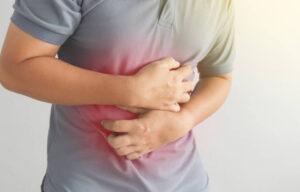For patients with stomach ulcers, getting good sleep at night is not particularly a walk in the park. This is understandably so, considering the levels of pain and discomfort that an ulcer brings. You still need to sleep though, so you must find tips on how to sleep with a stomach ulcer.
Before we begin though, it is important to understand what a stomach ulcer is and how it can cause discomfort, especially at bedtime.
What is a stomach ulcer?

It is simply a sore that develops on the lining of the oesophagus, stomach or small intestine. Ulcers occur when stomach acid damages the lining of the digestive tract. In order words, this type of ulcer occurs when the thick layer of mucus that protects your stomach from digestive juices is reduced. This allows the digestive acids to eat away at the tissues that line the stomach, causing an ulcer.
Stomach ulcers occur when acid in the digestive tract eats away at the inner surface of the stomach. The acid can create a painful open sore that may bleed.
The digestive tract is coated with a mucous layer that normally protects against acid. But if the amount of acid is increased or the amount of mucus is decreased, a person could develop an ulcer.
The common causes of stomach ulcers include the bacteria H. Pylori and long-term use of nonsteroidal anti-inflammatory drugs (NSAIDs) such as ibuprofen (Advil, Motrin IB, others) and naproxen sodium (Aleve). Stress and spicy foods do not cause peptic ulcers. However, they can make your symptoms worse.
The causes of a stomach ulcer are discussed below:
A bacterium: As earlier stated, Helicobacter pylori (knowns as H. pylori for short) bacteria commonly live in the mucous layer that covers and protects tissues that line the stomach. Often, the H. pylori bacterium causes no problems, but it can cause inflammation of the stomach’s inner layer, producing an ulcer.

It’s not clear how H. pylori infection spreads. People may also contract H. pylori through food and water. It may be transmitted from person to person through close contact, such as kissing.
Regular use of certain pain relievers. Taking ibuprofen, as well as certain over-the-counter and prescription pain medications called nonsteroidal anti-inflammatory drugs (NSAIDs), can irritate or inflame the lining of the stomach.

These medications include ibuprofen (Advil, Motrin IB, others), naproxen sodium (Aleve, Anaprox DS, others), ketoprofen and others. They do not include acetaminophen (Tylenol, others).
Other medications. Taking certain other medications along with NSAIDs, such as steroids, anticoagulants, low-dose aspirin, selective serotonin reuptake inhibitors (SSRIs), alendronate (Fosamax) and risedronate (Actonel), can greatly increase the chance of developing ulcers.
Fun fact: Contrary to popular misconceptions, scientific evidence has shown that skipping meals does not cause stomach ulcers, that is, not eating food will not cause you to develop ulcers!
Stomach ulcers can cause abdominal discomfort and pain. In some cases, ulcers don’t cause any symptoms. The most common ulcer symptom is a dull or burning pain in your belly between your breastbone and your belly button (navel). This pain often occurs around meal times and may keep you up at night. It can last from a few minutes to a few hours.
Risk factors:
In addition to having risks related to taking NSAIDs, the following may increase your risk of getting a stomach ulcer.
Smoking. Smoking may increase the risk of stomach ulcers in people who are infected with H. pylori.
Alcohol consumption. Alcohol can irritate and erode the mucous lining of the stomach, and it increases the amount of stomach acid that’s produced.
Others are:
Untreated stress.
Consuming spicy foods.
Alone, these factors do not cause ulcers, but they can make ulcers worse and more difficult to heal.
Complications
Left untreated, peptic ulcers can result in:
Internal bleeding: Bleeding can occur as slow blood loss that leads to anaemia or as severe blood loss that may require hospitalization or a blood transfusion.
A hole (perforation) in your stomach wall: Peptic ulcers can eat a hole through (perforate) the wall of your stomach or small intestine, putting you at risk of serious infection of your abdominal cavity.
Obstruction: Peptic ulcers can block the passage of food through the digestive tract, causing you to become full easily, to vomit and to lose weight either through swelling from inflammation or through scarring.
Gastric cancer: Studies have shown that people infected with H. pylori have an increased risk of gastric cancer.
Prevention
You may reduce your risk of peptic ulcer if you follow the same strategies recommended as home remedies to treat ulcers. It also may be helpful to:
Protect yourself from infections: It’s not clear just how H. pylori spread, but there’s some evidence that it could be transmitted from person to person or through food and water.
You can take steps to protect yourself from infections, such as H. pylori, by frequently washing your hands with soap and water and by eating foods that have been cooked completely.
Use caution with pain relievers: If you regularly use pain relievers that increase your risk of peptic ulcer, take steps to reduce your risk of stomach problems. For instance, take your medication with meals.
Work with your doctor to find the lowest dose possible that still gives you pain relief. Avoid drinking alcohol when taking your medication, since the two can combine to increase your risk of stomach upset.
If you need an NSAID, you may need to also take additional medications such as an antacid, a proton pump inhibitor, an acid blocker or a cytoprotective agent.
HOW TO SLEEP WITH A STOMACH ULCER
Having discussed ulcer and the discomfort they can cause, let us now talk about how to ensure that it does not interfere with your beauty sleep.
- Sleep positions: The way a person sleeps can affect their digestive system disorders, for example, ulcers and acid reflux. To relieve the symptoms of stomach ulcers, sleeping upright on your back or side uses gravity to help control the movement of stomach acids and may bring some relief. Use lots of pillows and try to keep your body elevated. If you suffer from a stomach ulcer, avoid sleeping on your stomach, as this can compress your digestive system and aggravate your symptoms. For this, however, further research is needed.
- Sleep better/longer hours: Studies have shown a correlation between better/longer sleep and stomach ulcers. The study found that people who slept nine or more hours each night had lower rates of stomach ulcers than those who slept seven hours. Cut screen time before bedtime and try to make yourself as comfortable as possible. The bottom line is, stomach ulcers can affect sleep quality, and poor sleep can make ulcers worse or cause them to return. In general, improving your bedtime hygiene will help you get better sleep.
- Diet: As earlier stated, it is a common misconception that acidic or spicy foods cause an ulcer. This has been debunked by establishing the causes of the ulcer which are H.pylori and long-term use of nonsteroidal anti-inflammatory drugs (NSAIDs). This does not mean that diet does not affect symptoms or the progression of ulcers. Eating triggers the production of stomach acids. Consuming a big meal or certain foods can increase stomach acids and worsen an ulcer. This may be especially true at night due to the positioning of the stomach and the movement of acids. Alcohol and caffeine contribute to stomach ulcer pain and poor sleep quality. Avoiding certain foods that trigger ulcer pain and limiting eating before bed can help relieve ulcer pain and improve sleep. When dealing with a digestive disorder, such as peptic ulcers in the stomach or duodenum, you must avoid a high-protein or high-fat meal before bedtime.
- Get treatment for your ulcer symptoms: The treatment for peptic ulcers depends on the cause. The overall aim of your medical treatment would involve limiting the colonization of the H. pylori bacterium if present, eliminating or reducing your use of NSAIDs, and speeding up the healing process of your peptic ulcer. Don’t just assume you have an ulcer, get a diagnosis from a doctor and also set up a treatment plan.
- Avoid going to bed immediately after meals: It has also been advised to avoid going to bed less than 2 hours after meals. Ideally, it is best to allow up to 3-4 hours after a meal before going to bed and ensure to keep dinner light.
- Stop smoking: Studies have shown that smoking increases stomach acid – which is responsible for aggravating the disease. In addition to disturbing the protective factors in your stomach, smoking also makes the gastric environment more susceptible to developing ulcers.
CONCLUSION
A stomach ulcer is simply a sore that develops on the lining of the oesophagus, stomach or small intestine. Contrary to popular belief, a stomach ulcer is not caused by spicy foods, even though these foods may worsen the symptoms of an ulcer.
The two major causes of stomach ulcers are the bacteria H. Pylori and the long-term use of nonsteroidal anti-inflammatory drugs (NSAIDs). To sleep better with a stomach ulcer, it is important to improve your diet, bedtime habits and lifestyle in general.



